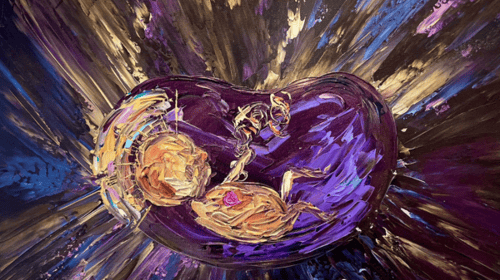As Christians, we celebrate God’s Incarnation in the person of Jesus. And for over 1,600 years, some church traditions have set aside a day at the end of March to celebrate that truth.
In our celebration of God’s Incarnation, we rejoice in two awesome and connected truths: first, that God the Son is fully human and fully divine, and second, that we and every human being bear God’s image and likeness. When God the Son became flesh, He developed in the womb and was born of a woman, like all babies are. Joining us in the fullness of our humanity from that point was intentional, so it must matter. Yet we don’t tend to think about those nine months before Jesus’ birth.
With this God Unborn series, we are led to think about the circumstances and the people at the point at which the Word became flesh, and ask God to reveal to us what He planned that we’ve forgotten, or perhaps never noticed.
When Mary said yes to God the Father, to be the mother of God the Son, it was the fulfilment of a promise from God that reached back to the garden of Eden. In Genesis 3:15, God promised salvation and redemption of the Fall. God’s plan was for “the seed of the woman” to conquer evil and that first gospel message (known as the Protoevangelium) came to fulfilment in the conception of Jesus – the seed in Mary’s womb – the Incarnation. Mary wasn’t saying yes to lending her womb for a transplanted Jesus. Scripture tells us Mary conceived by the Spirit. Through conception, her son was biologically related to her, sharing her DNA and humanity.
"Rejoice, Mary, you are favoured, you are chosen – did it feel like it?"
Mother and son shared a sacrificial love, each for the other, from His conception to His death. In her womb, He was safe and provided for. In His dying words, He provided for her. There was a shared dependence and vulnerability. Some women and some pregnancies are particularly vulnerable to social circumstances, and Mary and her pregnancy were among them. It was unexpected, and for Mary, unplanned. It required an astonishing amount of trust in God’s love, constant presence and purpose. This young woman, Luke tells us, was understandably afraid and confused but was still willing to say yes to God’s invitation. Mary’s trust in God the Father’s request to be the mother of His Son strikes a contrast to Eve’s lack of trust in God. Two women, a choice of trust, one declines, and one accepts, and what a vast difference there is in the contrasting outcomes.
We know Mary’s yes to this pregnancy risked her marriage and her life. We know, too, that the timing of Jesus’ conception meant a less-than-comfortable birth. What started with an arduous journey ended without the comfort of home and family. Then, it became the stuff of nightmares when a despotic king’s anger and jealousy forced Jesus and His parents to flee and live as refugees.
Rejoice, Mary, you are favoured, you are chosen – did it feel like it?
But Mary says yes and lives her yes. She trusts that the promise of God’s blessing – for her, her people, and the generations to come, would come through the birth of this child. This intentional and very human journey which God lived, speaks to His heart for both their lives, Mary and Jesus. And through their story, for both lives in every pregnancy. God is full of compassion and empathises with and understands the messiness and brokenness of life because He lived it, the unplanned and unexpected, in poverty and as a refugee. In the Bible story of the woman caught in adultery, we can appreciate Jesus’ reaction even more, in light of His own mother’s experience. The unique circumstances of Jesus’ conception could have led to accusations of adultery against Mary. Joseph’s righteousness protected Mary, and likewise Jesus’ mercy protected the woman from being stoned to death. And Jesus’ continued and intentional provision for His mother after His own death speaks to His care for us and His charge to care for the widow and orphan.
"With this God Unborn series, we are led to think about the circumstances and the people at the point at which the Word became flesh, and ask God to reveal to us what He planned that we’ve forgotten, or perhaps never noticed."
God’s love for and the value given to every human being, as His image-bearers, from before we were born, is rooted in His own unborn experience. The Saviour of all, the Seed of redemption, promised at the beginning of Genesis, as soon as sin entered creation, here on earth in Mary’s womb.
View the video and booklet:

God Unborn: Mary said yes
Lectio Divina devotional and video resource: Mary said yes



